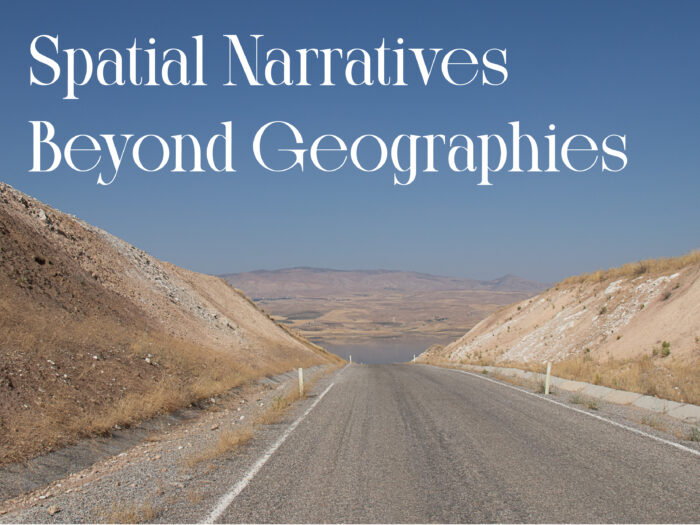First Event: July 19, 2025
⚠️ Update: Our first public event has been rescheduled to Saturday, July 19, 2025 at 5:00 PM. We are hosting Merve Gül Özokcu and Zeynep Ataş for this inaugural event.
Spatial Narratives Beyond Geographies is a year-long public program initiated by TOP e.V. dedicated to exploring architecture and spatial practice beyond disciplinary, geographic, and institutional boundaries. The series brings together a diverse group of practitioners—architects, researchers, activists, and artists—who work at the intersections of community-based design, cultural heritage, and socio-ecological transformation.
The program centers on alternative architectural narratives that emerge from contested territories, peripheral geographies, and informal or collective spatial strategies. It asks: How can architectural and spatial practices respond to displacement, ecological crisis, and social marginalization? What kinds of built environments and spatial imaginaries emerge from solidarity, memory, and repair?
Venue: TOP’s project space, Berlin
TOP project space
Schätzelbergstr 1-3, 12099 Berlin /
Entrance through the back side of the house: Industriestrasse 38, 12099 Berlin
Date: Saturday, July 19, 2025
Time: 5:00 PM
Tracing Memory, Making Space
Merve Gül Özokcu shares insights from Women Narrative Spaces, a research project that explores how women’s spatial memories—shaped by migration, domestic routines, and intergenerational storytelling—form alternative archives of place. The project maps out everyday practices that sustain cultural memory, spatial knowledge, and care across geographies through oral histories, drawings, and shared acts such as cooking.
The presentation also introduces Herkes İçin Mimarlık (Architecture for All), a collective founded in Istanbul in 2011 that brings residents, students, professionals, and decision-makers together to address urgent social and ecological issues. Working in both rural and urban contexts, the association fosters a critical architectural practice that is non-hierarchical, participatory, and rooted in community collaboration. Its projects—often hands-on, in situ, and grounded in experiential learning—demonstrate how spatial interventions can emerge from solidarity, inclusion, and lived experience.
Merve Gül Özokcu is an architect, researcher, and activist based in Istanbul, working at the intersection of the commons, eco-feminist narratives, and spatial justice. Through Herkes İçin Mimarlık (Architecture for All), she has co-led participatory, long-term, and proactive on-site interventions addressing political and ecological urgencies through collective action across Turkey. Merve is part of Arazi Assembly, a research collective based in southeast Anatolia, focusing on decolonial, care-driven knowledge practices. Her academic work explores alternative pedagogies and the performativity of architecture as a site of power, precarity, and resistance. Her projects – including Occupy Gezi Architecture, Women Narrative Spaces, and The Revitalisation of Abandoned Rural Schools – have been shared in contexts ranging from international institutions to rural commons.
Project Tandoori
Project Tandoori is an archival project documenting user-built architectures emerged in the rural settlements of Mardin and Sirnak, along the D-400 transnational trade route to Syria and Iraq. With the reuse of left-over materials from border trade trucks, auxiliary spaces of everyday life such as tandoori houses, poultries, or sheep pens are built by the locals themselves. By documenting these, Project Tandoori aims to analyse the architectural knowledge embodied in these architectures, just as another form of informal genius that appears in this part of the world.
Zeynep Atas is an Assistant Professor in the Department of Architecture at Mardin Artuklu University. Her research explores user-built architectures, urban geography, and architectural representation, with a particular interest in self-organizing processes—both in design and everyday life. Whether examining urban history or modes of representation, she approaches her academic work with a deep fascination for how spontaneous, bottom-up systems shape the built environment. She is currently on a research visit in Berlin on a DAAD grant.
Spatial Narratives Beyond Geographies is a year-long public program initiated by TOP e.V. starting in July 2025, dedicated to exploring architecture and spatial practice beyond disciplinary, geographic, and institutional boundaries. The series brings together a diverse group of practitioners—architects, researchers, activists, and artists—who work at the intersections of community-based design, cultural heritage, and socio-ecological transformation.
The series centers on alternative architectural narratives that emerge from contested territories, peripheral geographies, and informal or collective spatial strategies. It asks:
How can architectural and spatial practices respond to displacement, ecological crisis, and social marginalization?
What kinds of built environments and spatial imaginaries emerge from solidarity, memory, and repair?
Through a constellation of public talks, screenings, workshops, and roundtable discussions, the program will engage with themes such as traditional construction techniques, the preservation of cultural heritage, feminist urbanism, decolonial pedagogies, and participatory restoration. Contributors from various regions—including Turkey, Italy, Lebanon, and Germany—will bring lived experience and critical insights from their local contexts into shared dialogue.
The series will evolve organically over the course of one year, shaped by the urgencies and contributions of its participants. The first public event will take place on 13 July 2025 at TOP’s project space in Berlin, followed by gatherings in late August and late September, and culminating in a final public assembly in summer 2026.
Spatial Narratives Beyond Geographies is not just a lecture series—it is a collaborative platform for sharing tools, stories, and methodologies that challenge extractive systems and nurture radical forms of spatial care. It is an open invitation to reimagine how we inhabit space—together.

